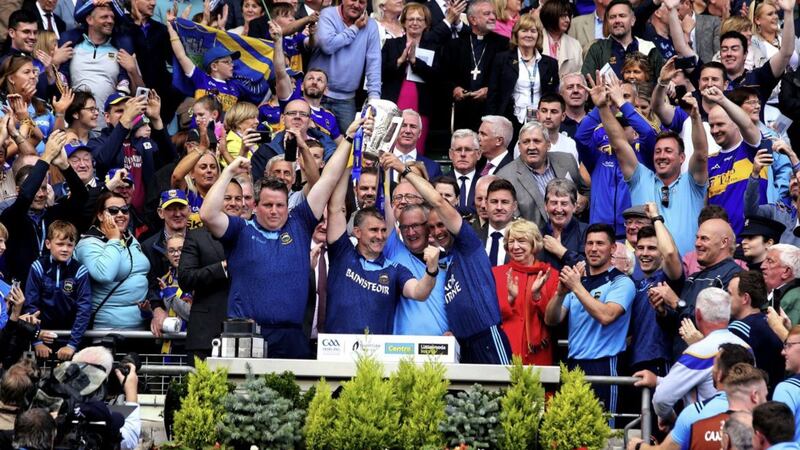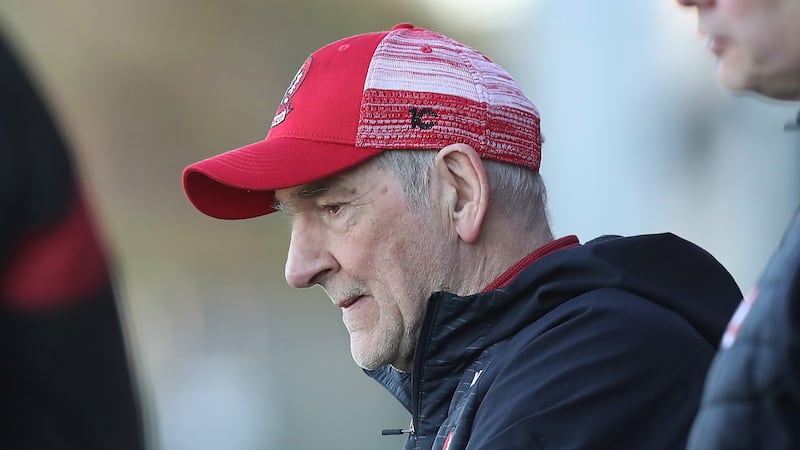WHEN Mick O’Dwyer was guiding his Kerry team to one All-Ireland after the next, it was all his own doing.
He would devise the tactics, take the training and pick the team himself.
The training was notoriously gruesome. In his book, Pat Spillane recalled players traipsing to Dublin for one pain-killing injection after the other, because their bodies couldn’t cope.
When they weren’t running laps of Fitzgerald Stadium, they were ploughing from wire-to-wire. Kerry had the ability to outplay everyone before he arrived, but they didn’t have the ability to outlast.
O’Dwyer believed Mikey Sheehy was two stone overweight when he took over, but by the following summer, he’d slimmed down off the back of the running demands.
In the era before sports science, it was effective.
The trick wasn’t getting them fit. It was getting them to buy in to the idea of getting fit.
That’s what management is, and that’s what O’Dwyer’s real skill was.
The passing of time has seen the GAA manager retain ultimate control of what happens in a setup, but in a very different sense, and with a lot less of a hands-on approach.
It is exceptionally rare now that you would see an inter-county manager involved in the delivery of a coaching session on the pitch.
Believe it or not, a very high percentage of them couldn’t take a good training session.
The truly successful managers are the ones with the humility that they’d tell you that themselves.
Where once taking the coaching was a key part of the job description, it’s now someone else’s responsibility.
It has to be.
The forensic approach required to organise a session fit for a top-level inter-county team now requires an entirely different skillset.
A coach must bring originality to the training ground. They have to bring enthusiasm. They have to bring understanding. They have to marry it to the physical demands required on any given particular evening. A Tuesday evening session can be completely different from a Thursday or Friday session in terms of the workload.
And they have to make it all fit into an hour or less, otherwise players start to get antsy or, far worse, bored.
When Tipperary hurling captain Séamus Callanan got the mic off John Horan in Croke Park, it seemed at one point that he’d still be talking when his team-mates were sitting back in Thurles with the Liam MacCarthy.
He referenced the fact that they’d carried a 40-man playing panel all year. Then he started to rhyme off everyone directly involved with the setup.
Four names stood out. One was Belfast native, and highly-rated strength and conditioning coach, Cairbre Ó Cairealláin, whose work with the players has been widely regarded as transformative for the whole setup.
Another was former playing legend Eoin Kelly, who dipped in and out to help with any specific needs they had, particularly the forwards and often in relation to free-taking.
A third was Eamon O’Shea. Just like Stephen Rochford, he had the humility to have been a manager and then stepped into a background role.
And lastly, Liam Sheedy himself. He was the figurehead. He engaged the players, sold them his vision (though it didn’t need selling to those that had already played for him).
On his personal LinkedIn page, Sheedy has his first spell with Tipperary listed under his employment history. In it, he references how he “inherited a team low in confidence and built them into the top performing team in the country”.
His second spell is almost an exact replica. Tipp didn’t make it out of the group stage in Munster last year. Even within this season, they took a provincial final hiding from Limerick, but had steely enough minds to bounce back and win an All-Ireland just seven weeks later.
That is management. Liam Sheedy is the foreman, directing all the workers beneath them.
No different from Jim Gavin. When they won the All-Ireland in 2016, Joe.ie listed the roles of his entire backroom team.
From the manager to the sports administrator to the head of high performance to the lifestyle coach to the stats men, they had 24 of a backroom in total.
Jim Gavin’s job is not to have men running wire-to-wire. It’s to manage all those people beneath him. Crucially, it’s about empowering them to do the jobs they’re there to do.
There’s an idea out there now that because of recent All-Ireland successes in both codes, the bigger the backroom team, the better. But that’s only the case if everyone has a specific role, and that they’re neither overlapping nor wasting time and money by adding no value.
That’s where a lot of county setups fail. A manager surrounds himself with too much of the one thing.
Indeed, you look at the proposed Fermanagh management team of Ryan McMenamin, Joe McMahon and Paul McIver, and before their appointment you’re looking at what exactly is the dynamic between the three?
McIver is the most natural manager of the trio, while McMenamin is more in the line of the coaching role he fulfilled last year, yet Ricey appears to be the man heading the ticket and therefore bound for overall control.
They could make a success of the job, but only if they get their roles right – and define them – before they start.
That’s also what makes it a huge winter now for Tyrone. In Stephen O’Neill and Peter Donnelly, they have effectively lost three men.
Donnelly was not only the S&C coach, but their primary football coach. O’Neill did a lot of the specific coaching work with the forwards too, the influence of which could be seen on Cathal McShane in particular.
As their setup currently stands, they don’t have an S&C coach, a football coach or a forwards coach. Neither Mickey Harte nor Gavin Devlin would specialise in any of those roles. They effectively need to find three men of the quality required by an All-Ireland chasing outfit.
It’s an absolute necessity for Tyrone that the replacements bring the same quality as their predecessors. Those skillsets will not be easy found.
Any winning team needs an army of good people around it. Every one of them has to bring value to their role.
The days of a manager being an island are long gone.









